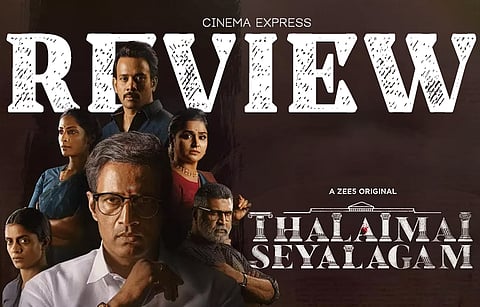Thalaimai Seyalagam Series Review: This complex tale of power play has intriguing characters and commendable writing
Thalaimai Seyalagam(3 / 5)
Vasanthabalan’s films consistently explore political themes, addressing caste, class, or societal issues. In his latest work, Thalaimai Seyalagam, Vasanthabalan delves into the core of politics, presenting a narrative about feudalism and the rise of Naxalism as a counterforce. Spanning eight episodes with three interwoven storylines, the series takes viewers across India, ultimately linking all threads to a single individual. Thalaimai Seyalagam is a political thriller with a whodunit element, leading audiences through a complex exploration of governance, policy changes, and political intrigue. Despite the challenge of connecting the numerous plot points, the series is compelling enough to even pique the interest of the apolitical.
Cast: Sriya Reddy, Kishore, Bharath, Ramya Nambessan, Aditya Menon, Santhana Bharathi, Kani Kusruti
Director: Vasanthabalan
In Thalaimai Seyalagam, Vasanthabalan weaves together three intricate storylines. On one hand, Chief Minister Arunachalam (Kishore) and his family face a corruption scandal that threatens their political standing. Concurrently, Inspector Manigandan (Bharath) is on a mission to solve the murder of a fellow police officer. Adding to the complexity, CBI officer Nawaz Khan (Aditya Menon) is delving into a 15-year-old cold case. While these disparate narratives eventually converge, the series' journey is marked by numerous twists and obstacles, making for a challenging yet engrossing watch.
In Thalaimai Seyalagam, the convergence of multiple storylines necessitates strong world-building, an aspect the series could have executed better. The series opens in Jharkhand with a 15-year-old crime, abruptly shifting to the present day with the case transferred to the CBI. Before viewers grasp the initial victim's identity, they're introduced to Chief Minister Arunachalam. This back-and-forth creates confusion when the Jharkhand case resurfaces through Nawaz Khan. Additionally, the series features numerous lead characters, and despite the use of labels for introductions, it takes time to understand their connections. For instance, Amudhavalli (Ramya Nambessan) is introduced as Arunachalam’s daughter and Tamil Nadu’s Finance Minister. Soon after, Minister Hariharan (Niroop Nandhakumar) refers to Arunachalam as ‘Mama,’ initially suggesting he might be Amudha’s husband. It is only later revealed that he is Arunachalam’s second son-in-law. This rushed world-building forces viewers to spend two to three episodes piecing together the characters and their relationships.
Viewers who are unversed in politics might find the events in Thalaimai Seyalagam a bit challenging. For those unfamiliar with feudalism and Naxalism, however, the series still provides something to chew on while hinting at a deeper exploration in a potential second season. It also offers surprisingly profound and unpredictable themes. While some may guess the culprit mid-season, the central character's motivations remain veiled until the very end. Ultimately, the climax that dots all i’s and crosses all t’s makes for a brilliant payoff, justifying the wait and confusion all along.
Performances and writing are possibly the most commendable aspects of Thalamai Seyalagam. Sriya Reddy plays the lead role of Kottravai, a brave and defiant journalist and political advisor. Sriya’s very presence on screen makes you think of her loud, powerful scream from Thimiru, where she played the villain Easwari. Kottravai is also a strong woman, but she nonetheless chooses diplomacy, literary intelligence, and patience to achieve what she is set out for. Kottravai's quiet strength shines through in her dialogue. Lines like "Merku Thodarchi mala mela oorura erumbu, indha malaiye naama dhaan thaangarom nu nenachidhaan," spoken when Chief Minister Arunachalam faces immense pressure, showcase her strategic mind. She further quotes a line by Kannadasan, making Kottravai a woman of her brain versus a woman whose emotions take over in difficult times. Sriya steps out of her comfort zone to provide a restrained performance, one that makes you side with her character, even if her actions are morally ambiguous.
Besides creating the richly developed Kottravai, Vasanthabalan, along with writers SK Jeeva and Bharani Giri, has crafted profound arcs for every other character in Thalaimai Seyalagam. Inspector Manigandan’s relentless pursuit of justice is rooted in his Army upbringing and the loss of his father in battle. CBI officer Nawaz Khan, a devout Muslim, observes his Ramzan fast with full conviction while meticulously investigating a challenging case. The series also explores deep relationships and personal revelations. The bond between Minister Selvapuviarasan (Santhana Bharathi) and CM Arunachalam is beautifully depicted, as is a poignant scene between Durga (Kani Kusruti) and Maya (Sarah Black), where Maya uncovers a significant truth about her life. Additionally, Amudhavalli’s darker intentions are revealed when she accuses her father of ruining her life, showcasing her complex character. These intricate character developments elevate Thalaimai Seyalagam beyond a typical political crime thriller, making it a compelling drama with deeply rooted characters.
The climax of Thalaimai Seyalagam provides a wonderful connection back to the series’ title, as it reiterates that change can only be made where all the decisions are taken—at the headquarters. With some characters dead and others creating a potential return for another season, we wonder what season two might have in store for us. At the end, Thalaimai Seyalagam is a series filled with characters with flaws and their own justifications for their actions. As the credits rolled, I couldn’t help but get reminded of Swami Vivekananda’s quote: “Truth can be stated in a thousand different ways, yet each one can be true.”

